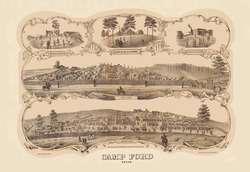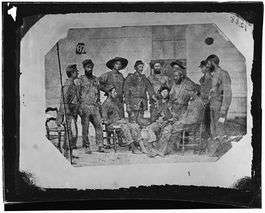Camp Ford
| Camp Ford | |
|---|---|
 | |
| Location | Tyler, Texas |
| Coordinates | 32°23′44.13″N 95°16′07.28″W / 32.3955917°N 95.2686889°WCoordinates: 32°23′44.13″N 95°16′07.28″W / 32.3955917°N 95.2686889°W |
| Established | 1996 |
| Governing body | Smith County Historical Society |
 Location of Camp Ford in Texas | |
Camp Ford was a prisoner of war camp near Tyler, Texas, during the American Civil War.[1] It was the largest Confederate-run prison west of the Mississippi River.[2][3]
Established in the spring of 1862 as a training camp for new Confederate recruits, the camp was named for Col. John Salmon Ford, a Texas Ranger and the Superintendent of Conscripts for the State of Texas.[4] The first Union prisoners to arrive at camp Ford in August 1863 included officers captured in Brashear City Louisiana in June, and included naval personnel captured when the 'Queen Of The West' and the 'Diana' were seized by the Union Navy. The captives were initially held in the open, but a panic ensued in November 1863 when 800 new prisoners threatened a mass breakout. A military stockade enclosing 4 acres (16,000 m2) was soon erected.[3]

With over 2,000 new prisoners taken in Louisiana on April 8 and 9 1864, at the battles of Mansfield, and Pleasant Hill, the stockade was quadrupled in size. Among those imprisoned there following these battles were 17 members of the 47th Pennsylvania Infantry, the only regiment from the Commonwealth of Pennsylvania to fight in the Union's 1864 Red River Campaign across Louisiana and the only regiment from the Keystone State to have men imprisoned at Camp Ford.[5] [6]
With more prisoners captured in Arkansas, the prison's population peaked at about 5,000 in July 1864. The population was reduced by exchanges in July and October 1864,[3] and again in February 1865. The last 1,761 prisoners were exchanged on May 22, 1865.[2]
Summary Executions of Local Citizens, Recounted by 49th Ohio prisoners at Camp Ford: From "Twenty Months in the Dept of the Gulf", A.G.H. DuGanne "Among the last-mentioned local events, however, was the "Match Plot," which deserves a paragraph".
"The breaking out of fires in several stores, at Tyler and other places, awakened a suspicion that two merchants from the Northern States, (who had purchased patent matches, which ignited almost spontaneously,) were incendiaries". "The usual senseless hue and cry followed; the traders were thrown into prison; and hundreds of hapless blacks were arrested and tortured -- in order to get evidence of the "Yankee Conspiracy." "Free negros and poor white settlers from the North fell under the ban at once. Scores of the latter were hanged by the mob". "More than a hundred negros, free and bond, were executed, as I have been informed, on suspicion alone". "Several were burned at the stake". "Thirty white and free men were lynched, in and about Tyler and Palestine; one of the unfortunate merchants who had introduced the matches undergoing this fate -- the other escaping by timely flight". "Blood flowed in all quarters, till the enlightened "Regulators," finding no more poor whites to kill or banish, decided that "order reigned" again".
"Burning men and women at the stake is a relic of aboriginal amusement". "A negro was thus executed at Tyler, while our prisoners tarried at Camp Ford". "The occasion furnished a gala-day for all the good people of Smith County, our guards included".
"I heard one day a story of lynch-law executed in our camp neighborhood; my informant being a friendly guard, who, like many others, was Union at heart, although conforming outwardly to rebel service, as a volunteer".
"During the winter, an old lady, living in Van Zandt County, was plundered by a gang of soldiers in Confederate grey, who beat her shamefully, and (as she told the story,) tied her up by her thumbs till she disclosed the place where was concealed her specie (some three hundred dollars) and about two thousand dollars in Confederate currency". "It was asserted that Jayhawkers had done this deed, though sober people shook their heads; well knowing that squads of Sibley's men, with some of Richardson's guerillas, and the scattered miscreants of Quantrell's gang, were ranging through these upper counties". "But "black flag" rebels charged the crime, as they would any crime, on Union men—of whom hundreds, former citizens, were fugitives in swamps and timber, hiding from conscript hunters". "It was easy to accuse such outlawed wanderers; so the chase became set after "Union men." Four individuals were speedily run down: one Reed, a former sheriff of Collin County; an aged citizen, McReynolds, or McRunnells, who bad been chief-justice of that district; and two young men, Holcombe and Davis". "They were arrested at their homes and dragged to Tyler".
"This was in May, when our prison-numbers, at Camp Ford, had been increased some thousands, after the battle of Mansfield. The rebels were exultant everywhere, but with characteristic cowardice the people of these counties feared an outbreak from so large a body of incarcerated Yankees, and affected to discover insurrectionary plots continually". "Three noble-hearted Texans, who refused to bow the knee to Davis, were imprisoned in our guardhouse at Camp Ford -- two brothers, Whitmore, one of whom had been a prominent member of the Legislature, and Rosenbaum, a former attorney-general of the state". "It was the policy of rank Secessionists to fix as many new crimes on the Union men as could be believed, in order that some pretext might be found for general massacre or the enacting of terror laws".
"Hence, when Sheriff Reed and Judge McReynolds were thrown into prison at Tyler, it was decided that they should never go at large again". "So, one May morning, fifty mounted "Regulators" clattered into Tyler, halted at the tavern door, and "liquored round;" held confab with the provost-marshal, galloped up and down the town awhile, and finally drew rein before the prison, with a yell":
"Bring out them Jayhawkers!"
"The doors were opened, and the men delivered up". "A rope being slung about them, they were dragged behind the Lynchers to a piece of timber, scarce half a mile out of Tyler". "There, almost within gun-shot of camps, where fifteen hundred cavalry and infantry were guarding Federal prisoners, these Lynchers began their mockery of a trial". "The first victim pleaded "not guilty."
"You lie, Jim Reed! You're a heap wuss Jayhawker than Gineral Banks!"
"Silence in the coort!" cries Justice Lynch, a bullheaded whiskey-still proprietor". "Keep still, you all, while I fix his flint". "Prisoner, Jim Reed, what have you got to say why you oughtn't to be black-jacked?"
REED. -- "I am not guilty. I've been hunted and persecuted for my sentiments ever since the State seceded. I never fought against the State. My house was burned over the heads of my family in the town where I lived, an honest man, and served the country". "I had to fly, by night, with my wife and seven children, to Van Zandt, and they hounded me out of that". "I declare before Heaven that"—LYNCH, C. J. -- Shet up! You know yer an old scoundrel, and yer was three ye'rs in Missouri Penitentiary—REED—I never was in the State of Missouri.
LYNCH, C. J. -- Blast yer, then, yer an old deserter from General McCulloch's army. The papers was found on ye, and yer can't swar 'em down.
REED. -- I deny it. I was regularly commissioned by General McCulloch, as an officer. He gave me a position because I preferred to go back to the army rather than be hunted down. I was preparing to join my command when arrested.
LYNCH, C. J. -- Yer a skulkin' liar and a thief, Jim Reed, and we've jest had palaver enough out o' yer. I pronounce judgment of the coort. Yer to be hanged at once, till yer dead, dead, dead! and Lord have marcy on yer soul!
"Five minutes after, Sheriff Reed was dangling from an oak-limb above his murderers".
"Judge McReynolds was then dragged forward and reviled by the "coort" in like manner". "The old man's son, who was one of the rebel soldiers guarding us at Camp Ford, heard about the Lynchers visiting Tyler jail, and, mounting a horse, galloped from his quarters to the town". "He there learned that the ruffians bad taken their prisoners to the woods". "He followed their trail with all the speed he could command, but arrived in time only to find his father swinging on the tree, from which Reed's dead body had been just cut down". "This wretched son was forced to beg the remains of his parent from the assassins; and so great was the terror inspired by the boldness and cruelty of these "Regulators," that young McReynolds was unable to hire a wagon to convey the corpse to Kaufman county, where his family lived".
"Young Holcombe -- like each of the others -- stoutly maintained his innocence, and was hanged with the same noose that had strangled his predecessors; for the ruffians had provided only rope enough to hang a single man; and were obliged to wait until one was dead before proceeding to execute another".
During the course of the war, the total number of prisoners who passed through the camp was slightly more than 5,500. About 327 prisoners died in captivity, giving the camp a mortality rate of 5.9%, one of the lowest of any Civil War prison. The deceased prisoners were reinterred to the Pineville, Louisiana, National Cemetery in 1867.[2]
Historic Park
The original site of the Camp stockade is now a public historic park, owned by Smith County, Texas, and managed by the Smith County Historical Society, a 501(c)(3) non-profit organization founded in 1959 by individuals and business firms dedicated to discovering, collecting and preserving data, records and other items relating to the history of Smith County. The park contains a kiosk, paved trail, interpretive signage, a cabin reconstruction, and a picnic area.[7]
The park is located on US Highway 271, .7 miles north of Loop 323 in Tyler, Texas. The geographical coordinates are: 32°23'44.13"N - 95°16'7.28"W
See also
- List of Civil War POW Prisons and Camps
- American Civil War
- Trans-Mississippi Theater of the American Civil War
References
- ↑ House of Representatives: Report on the Treatment of Prisoners of War by the Rebel Authorities during the War of the Rebellion, page 199. Washington, Government Printing Office, 1869.
- 1 2 3 "A Short History of Camp Ford". Smith County Historical Society, Tyler, Texas. Archived from the original on 2010-11-29. Retrieved 21 Mar 2011.
- 1 2 3 Texas State Historical Society: Camp Ford. Retrieved August 18, 2010.
- ↑ Texas Beyond History, Camp Ford
- ↑ Snyder, Laurie. Red River Campaign (Louisiana, March to May 1864), in 47th Pennsylvania Volunteers: One Civil War Regiment's Story. Retrieved online, March 17, 2017.
- ↑ 47th Pennsylvania Volunteer Records, in Camp Ford Prisoner of War Database. Tyler, Texas: The Smith County Historical Society, 1864.
- ↑ Smith County Historical Society: Camp Ford.
External links
- Texas Beyond History: Camp Ford
- Civil War Prisons
- The American Civil War; Prisoner of War Camps